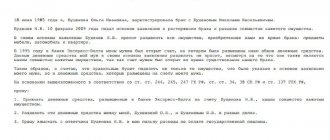Types of collateral
Article 140 of the Civil Procedure Code of the Russian Federation establishes a list of interim measures. When dividing jointly acquired property, the following measures are applied.
Arrest
It is imposed on property registered in the name of the respondent spouse. This can be either movable (car, furniture, etc.) or immovable property (apartment, plot of land, etc.). This encumbrance also applies to funds, cash or bank deposits.
In this case, the seized item may be in the use of either one of the spouses or other persons.
Prohibition to carry out specific actions
The defendant is not allowed to carry out a number of procedures during the period of restrictions. As a rule, these are any manipulations that are aimed at alienating a thing (purchase and sale, donation, etc.) or its damage or destruction (disassembly, dismantling).
Prohibition of other persons to carry out actions related to acquired and subject to division of marital property
The ban may apply to actions that could lead to damage or destruction of the item. In addition, a prohibition may be imposed on transferring property to the defendant or fulfilling any obligations.
An example from judicial practice
Petrov A.P. borrowed money from the Valuev spouses in the amount of 500,000 rubles. The transaction was formalized with a receipt issued only in the name of O.D. Valuev’s husband. After some time, the couple decided to divorce. When filing a claim for division of property, Valuev’s wife A.B. filed a petition for security.
The court imposed restrictions, prohibiting Petrov A.P. return the borrowed money to the defendant O.D. Valuev, who was listed on the receipt. The motivation for this decision was that these funds are family funds. Returning them only to the husband may complicate the division in the future.
- Property that is pledged cannot be seized.
- The court has the right to apply one security measure or several at the same time.
How is a car seized during a divorce?
The choice of options is based on many factors: whether the car was purchased on credit, under a general power of attorney, before the wedding, but if living together, the number of vehicles the divorcees have. As a rule, the car is registered in the name of one of the applicants, which creates the possibility of abuse. The car can be urgently re-registered in the name of relatives, sold to third parties, or simply hidden in an unknown place. In this case, the only legal way not to lose your rights and not to delay the division process is to seize the car during a divorce.
- prohibition of the defendant from the actions specified in the resolution aimed at the alienation of property;
- prohibition of third parties from making property transactions aimed at the subject of the dispute and from fulfilling obligations towards the defendant;
- suspension of the sale of a car by executive bodies, except in cases of exclusion from the inventory;
- temporary suspension of penalties under executive documents if the sale of the seized object is required.
You may be interested in:: Can Bailiffs Seize a Wife’s Car for Her Husband’s Debts
The procedure for imposing an encumbrance
The court has the right to arrest or impose other restrictions at any time before it makes a decision. To do this, the interested person must submit a corresponding application. You can do this as follows:
- Directly in the text of the claim.
- A separate document along with the application.
- By an independent petition at any stage of the consideration of the case, before the court retires to the deliberation room.
The state fee is not paid when filing a request for arrest.
The court is obliged to consider the petition and make a decision on it on the day it is received. In this case, neither the husband, nor the wife, nor third parties are subject to summons. The court makes a decision alone.
If the petition is satisfied and the seizure is imposed, the corresponding decision is sent to the plaintiff and defendant. Also, the court immediately sends it to all registration authorities - Rosreestr, traffic police and other authorities. It is also sent to bailiffs.
Seizing a car during a divorce
In this case, the recovering spouse must file a claim with the court with a request to take interim measures. The bailiff makes a decision to satisfy the application or to refuse no later than one day after registration of the application .
Filing a claim for garnishment or petition; Consideration of the plaintiff's claim or petition. According to Article 141 of the Code of Civil Procedure of the Russian Federation, a petition is considered on the day of filing, a claim - on the day the claim is accepted; Issuance of a court ruling on seizure; Issuance by the court of a writ of execution for seizure. According to Article 142, a writ of execution is issued by the court immediately after the ruling is made; Submitting a writ of execution to the bailiff service department at the defendant’s place of residence; Enforcement proceedings are carried out by the bailiff immediately, without notifying the defendant of the possibility of voluntary execution. In relation to the property that is subject to registration (land plots, apartments, dachas, residential buildings, vehicles), the bailiff not only issues an arrest order, but also sends it to the registration authorities. For the remaining property that is not subject to registration (for example, household items, electronics), the bailiff draws up an inventory report and seizes it. Submit a petition to the court to secure the claim and seize the common property.
21 Apr 2021 lawbellex 70
Share this post
- Related Posts
- How to call a technician from BTI to make changes to the registration certificate of a residential building
- How to find out the debt of utilities via the Internet in Samara
- How to Move Faster in Line with a Young Family
- Benefits for Renting Housing for Combat Veterans
Contents and required documents
When drawing up an application, the following data is entered into its form:
- Name of the court.
- Parties to the case – full name, contact details.
- The title is “Petition to secure a claim.”
- Brief summary of the essence (“A case regarding the division of property is pending before the court” or “A claim for division has been filed”).
- Justification for the need to seize (“Without these measures it will be impossible or extremely difficult to execute the decision”). If there is information that the spouse is trying to alienate something from the joint property, evidence of this must be attached. For example, a screenshot of an advertisement for the sale of a car from the corresponding website.
- A list of specific property for which the plaintiff requests to be seized.
- Justification that this property is jointly acquired and subject to division.
- Demand to seize.
- Date, signature.
An example of a petition will be below in the article.
When a request for security measures is supposed to be stated in a statement of claim, this is done as follows:
- The text directly indicates the need to apply encumbrances.
- The property objects planned for interim measures are listed.
- In the pleading part of the claim, a separate paragraph sets out the demand for seizure.
It is highly advisable to attach documents confirming the rights to the property to the application. However, if they are not in hand (the other spouse does not give them) and it is impossible to obtain them on your own, then taking into account judicial practice, interim measures may be applied even without documents.
To do this, the property must be clearly identified in the application. That is, if this is real estate, indicate its name, address, location, area, cadastral number. In case of seizure of a car - its make, model, registration plate.
You can submit an application:
- In person, through the court office.
- Sent by mail.
- By filling out a special form on the court’s website, sealing it with an enhanced electronic signature.
If the situation is such that it is necessary to make an arrest as quickly as possible and prevent the unscrupulous spouse from reregistering family property, it is better to submit the petition in person. In this case, it will be immediately registered and sent to the judge. Throughout the day, the application will be considered and a decision will be made.
How to remove a lien from a car
Citizens are often interested in: if they are found to be debtors by a court decision, how quickly will their property, including their car, be seized. It is worth noting here that if the court has not imposed measures to secure the claim, then the arrest will not be imposed very quickly: first, the claimant will need to obtain a writ of execution, which will then be sent to the bailiff service. Then the bailiff will initiate enforcement proceedings and send a resolution to impose a ban on registration actions to the traffic police. And only after these procedures will the vehicle be seized.
You may be interested in:: Filling out the Ukrina House Book
One of the common measures to secure claims is the seizure of citizens' property. These activities can be carried out by law by customs officers and bailiffs. This is done with the aim of imposing restrictions on the use and disposal of property by its owner. Therefore, many people who find themselves in such a situation are wondering how to remove the seizure of a car imposed by a court.
In a case of bankruptcy of a citizen or legal entity, a seizure imposed by a court may remain in effect until the vehicle is sold at public auction and it will be possible to remove it only at the request of the insolvency administrator. Law enforcement agencies impose bans until the end of the investigation or the establishment of all the circumstances in the criminal case. If it is determined that the vehicle was not involved in an illegal act, the arrest may be lifted at the request of its owner by a police officer or an investigative committee officer.
When purchasing a car, a potential buyer may find that the car is subject to a registration ban. Is this circumstance something dangerous for the buyer? In what cases is this prohibition imposed? And how is the ban lifted? These issues will be discussed below.
- On the judicial proceedings of a claim for division of property (name of the court, case number);
- Description of the disputed property indicating the full name, characteristics, ownership (personal or joint), location;
- A description of the circumstances that, in the opinion of the plaintiff spouse, are grounds for believing that the defendant spouse may take illegal actions, as a result of which the implementation of the court decision will be difficult or impossible;
- References to norms of civil and civil procedural legislation confirming the legality of the seizure;
- Request for seizure as a measure to ensure the safety of the disputed property.
According to the provisions of family law, if the husband and wife cannot reach a compromise regarding the division of common property, the court will resolve the dispute - by virtue of clause 3 of Art. 38 RF IC. But in the process of preparing, filing and considering a claim, unscrupulous spouses often commit illegal actions with real estate, cars, money, jewelry and even household items - they hide, give, sell. This becomes an obstacle to the implementation of the court decision.
Appeal
When the defendant receives an arrest warrant, he has the right to appeal it. He is given 15 days to do this from the date of receipt of the decision.
It makes sense to file a private complaint when the defendant’s sole property is seized. For example, for a house that he received under a will or as a gift. Since such property is not subject to division during a divorce, its seizure infringes on the rights of the defendant. Evidence must be provided to support the arguments presented.
A private complaint is filed with the same court that imposed the encumbrance. It is reviewed by a higher authority.
Filing a complaint does not in itself cancel interim measures. They begin to operate from the moment the decision is made.
Consequences of interim measures
When the court imposes security measures, the defendant does not have the right to dispose of the encumbered property. He will not be able to make a transaction with it that requires registration.
So, he may try to sell or donate a jointly owned apartment or car. When submitting documents for registration to Rosreestr or the State Traffic Safety Inspectorate, they will not be accepted. The transaction will not be registered.
In this case, such an unscrupulous spouse who violates the court decision is subject to a fine in the amount of 1,000 rubles.
Cancellation of arrest
Interim measures remain in force until the end of the proceedings. The following features are available:
- If the claim is rejected, the arrest is valid until the decision comes into force, but the court, when making it or after that, can cancel the security measures.
- If the demands are satisfied, the arrest remains in force until the decision is fully implemented. For example, if an apartment is divided, then until its part is re-registered in Rosreestr to the wife, the encumbrance continues to apply.
Also, security measures can be canceled if one of the parties requests it or on the initiative of the court. This is permissible at any stage of the proceedings.
In this case, the plaintiff and defendant are sent summonses to resolve this issue. If they do not appear, the court will consider the petition and make a decision without them.
When the arrest and other encumbrances are cancelled, the registration authorities are immediately informed about this. This decision can be appealed by the dissenting party.










